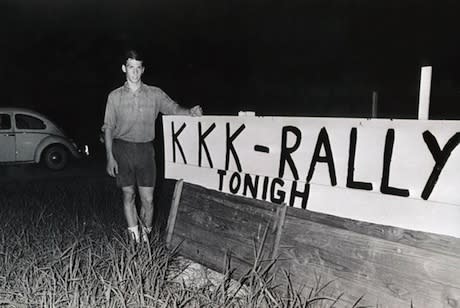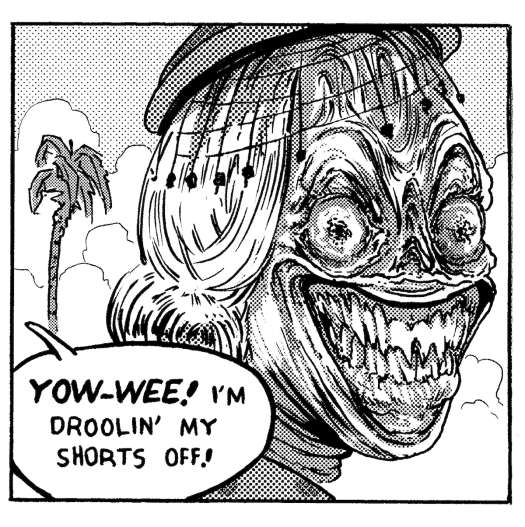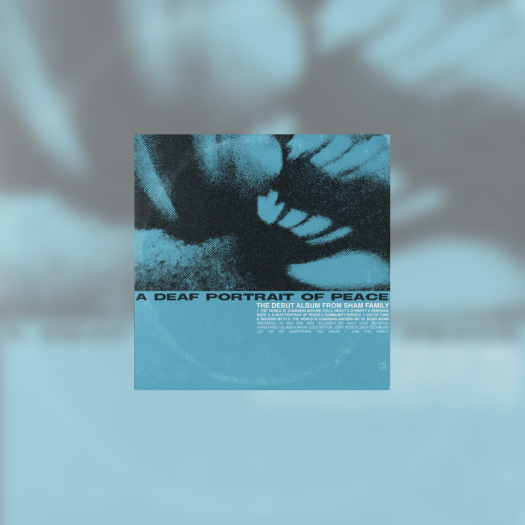In 1965, a young, idealistic Paul Saltzman traveled to Mississippi from Toronto to volunteer as a civil rights worker after hearing about the murder of three SNCC members the year prior. Upon his arrival, Saltzman was physically assaulted by KKK member Byron "Delay" de la Beckwith and two of his friends outside of a courthouse. The goal was to deter Saltzman and other northern political do-gooders from getting involved in Mississippi racial disharmony.
Seemingly, the impetus behind Saltzman's highly disorganized and unfocused issue-doc, The Last White Knight, is that of reconciliation. Going back to Mississippi, he sits down with Delay to discuss their opposing worldviews and the various signifiers and realities of racial inequality and "white power" in '60s southern America.
For the laymen, these conversations prove horrifying and infuriating, featuring the candid, playful sanctimony of an unabashed racial purist that casually drops the "N" bomb when discussing how God made the white man to take charge and lead other, weaker races that simply can't operate effectively.
Snickering during discussions of hate crimes and proudly displaying his weaponry, Delay represents the absolute archetype of how implicit American freedom and belief in individual discernment can result in something deadly and horrifying.
The problem with The Last White Knight is that beyond the shock and awe of watching a sociopath babble about superior races, there's very little holding it together. Morgan Freeman and Harry Belafonte pop up to provide some context of social climate, discussing the nature of "race" as an issue, but these discussions do little to reiterate Saltzman's template of reconciliation.
In fact, beyond learning a little bit about how the civil rights movement operated in the face of aggressive intimidation tactics — and even murder — by Klansmen, there isn't much here to substantiate a feature-length film.
If Saltzman had found a better way to integrate his meeting with Delay with civil rights and the KKK, he could have created a rather powerful and important documentary. But as it stands, he's done little more than clump together a lot of compelling material in a thematically disorienting mishmash of sensationalist melodrama.
(Canada Media Fund)Seemingly, the impetus behind Saltzman's highly disorganized and unfocused issue-doc, The Last White Knight, is that of reconciliation. Going back to Mississippi, he sits down with Delay to discuss their opposing worldviews and the various signifiers and realities of racial inequality and "white power" in '60s southern America.
For the laymen, these conversations prove horrifying and infuriating, featuring the candid, playful sanctimony of an unabashed racial purist that casually drops the "N" bomb when discussing how God made the white man to take charge and lead other, weaker races that simply can't operate effectively.
Snickering during discussions of hate crimes and proudly displaying his weaponry, Delay represents the absolute archetype of how implicit American freedom and belief in individual discernment can result in something deadly and horrifying.
The problem with The Last White Knight is that beyond the shock and awe of watching a sociopath babble about superior races, there's very little holding it together. Morgan Freeman and Harry Belafonte pop up to provide some context of social climate, discussing the nature of "race" as an issue, but these discussions do little to reiterate Saltzman's template of reconciliation.
In fact, beyond learning a little bit about how the civil rights movement operated in the face of aggressive intimidation tactics — and even murder — by Klansmen, there isn't much here to substantiate a feature-length film.
If Saltzman had found a better way to integrate his meeting with Delay with civil rights and the KKK, he could have created a rather powerful and important documentary. But as it stands, he's done little more than clump together a lot of compelling material in a thematically disorienting mishmash of sensationalist melodrama.




